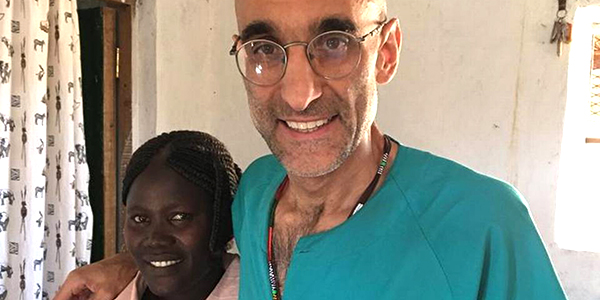After a papal Mass in Casa Santa Marta almost a year ago, a distressed businessman approached Pope Francis. Tears were in his eyes. “I have to make a declaration of bankruptcy,” he explained to the Pope. “It would mean firing 60 workers, and I do not want to, because I feel like I’m firing myself.”
Francis told this story last Saturday during a discussion at a steel factory in Genoa, in the north west of Italy, as an example of a “good” business owner. The man who approached him had “fought and prayed” for his workers, the Pope said; he saw them as his family and was only laying them off as a last resort.
The Pope was responding to a question by an engineer and entrepreneur who had asked him about the “excessive bureaucracy” faced by ordinary Italian businessmen. It was a pertinent question, given that Francis has developed an image of being an anti-capitalist – even being labelled a Marxist – for describing the Western laissez-faire financial system as “an economy that kills”.
In his reply, Francis belied his anti-corporate caricature with a warm endorsement of the value of entrepreneurship. “The businessman is a key figure in any good economy,” he told his audience. “There is no good business without good entrepreneurs, without your ability to create, to create jobs, to create products.”
So is the “Marxist Pope” now an uncritical fan of entrepreneurs? The Pope’s views on business are firmly rooted in Catholic Social Teaching, where making a profit is seen as good but the pursuit of profit at the expense of people’s livelihoods is wrong. And the Argentinian Pope, scarred from witnessing two devastating economic depressions in his homeland and faced with a global financial system in which levels of inequality and greed would make Gordon Gekko blush, has been ready to speak out on capitalism’s excesses.
It is the “speculators” who are the problem, according to Francis: those who are blind to the human faces behind the businesses they own. They exploit people, they close down warehouses and offices, simply to meet their profit targets. “A disease of the economy is the progressive transformation of entrepreneurs into speculators,” he said in Genoa. “Behind the speculator’s decisions there are no people, and therefore we do not see the people who are to be dismissed and cut out.”
While in Genoa, the Pope also returned to one of his favourite themes: the rooting out of clericalism and the need for a “pastoral conversion” of the priesthood. If there is one thing that makes Francis’ blood boil, it is a priest or bishop who “lords it over” his flock or is more preoccupied with the trappings of power than with the pastoral care of his people.
Francis wants priests to be out on the street, ready to roll up their sleeves and immerse themselves in the messy reality of their parishioners’ lives. To be humble, authentic and ready to learn.
“There is a danger, and it is of creating the image of a priest who knows everything, and does not need any advice,” he told a gathering of local clergy. “Kids may say, ‘but he is like a Google and Wikipedia priest!’ And this is so bad for our priestly life.”
Francis also warned against a “static life”, where a priest “has everything sorted out, everything in order, well structured and in its place”. He went on: “Maybe that pastor is a good businessman, but is he a Christian? Or does he live as a Christian?”
Tough words, but the Pope believes connecting with people must be the priority for every priest. He still sees himself as a street pastor, the same Archbishop of Buenos Aires who spent his weekends visiting the city’s slums. It is why Francis recently turned up, unannounced, on the doorstep of a dozen homes in a parish in Ostia, on the outskirts of Rome, to perform traditional post-Easter house blessings.
Francis doesn’t do this sort of thing out of duty. He draws energy from those encounters. He is trying to invert the usual model of priestly ministry. In serving the people and by bringing them the sacraments, the priest himself “receives” the inspiration he needs to sustain his ministry.
As the cameras furiously clicked away inside the Vatican’s Apostolic Palace, President Donald Trump stopped and turned to them with a beaming smile. Next to him was Pope Francis, looking decidedly down in the dumps. “Pope looks glum after meeting Trump,” the headlines announced as the pictures went up on news sites and social media across the world.
Commentators looking at the two leaders’ expressions had jumped to the conclusion: the Pope looks unhappy because he didn’t like big, bad Mr Trump. But hang on! A few days later and the nice, warm, progressive Prime Minister of Canada, Justin Trudeau, meets Francis in the Vatican – and the Pope is wearing the same expression.
The truth is that the Jesuit Pope regularly looks morose when posing for formal photos. “He just doesn’t like having his picture taken,” someone who knows him well told me. So while it’s possible Francis was unimpressed by Mr Trump, or by Mr Trudeau for that matter, the official photo isn’t always a giveaway.
01 June 2017, The Tablet
View from Rome
 Loading ...
Loading ...
Get Instant Access
Subscribe to The Tablet for just £7.99
Subscribe today to take advantage of our introductory offers and enjoy 30 days' access for just £7.99

